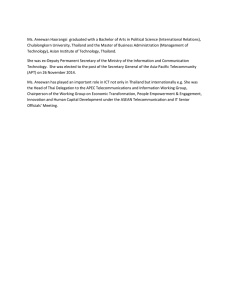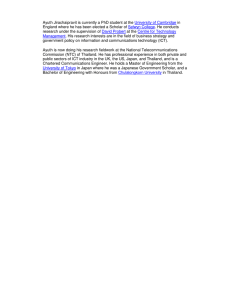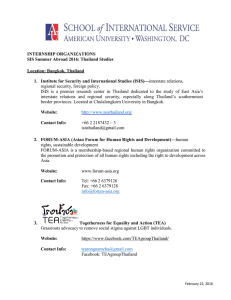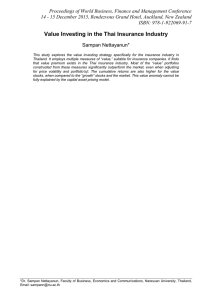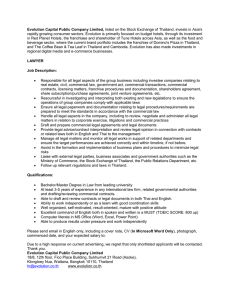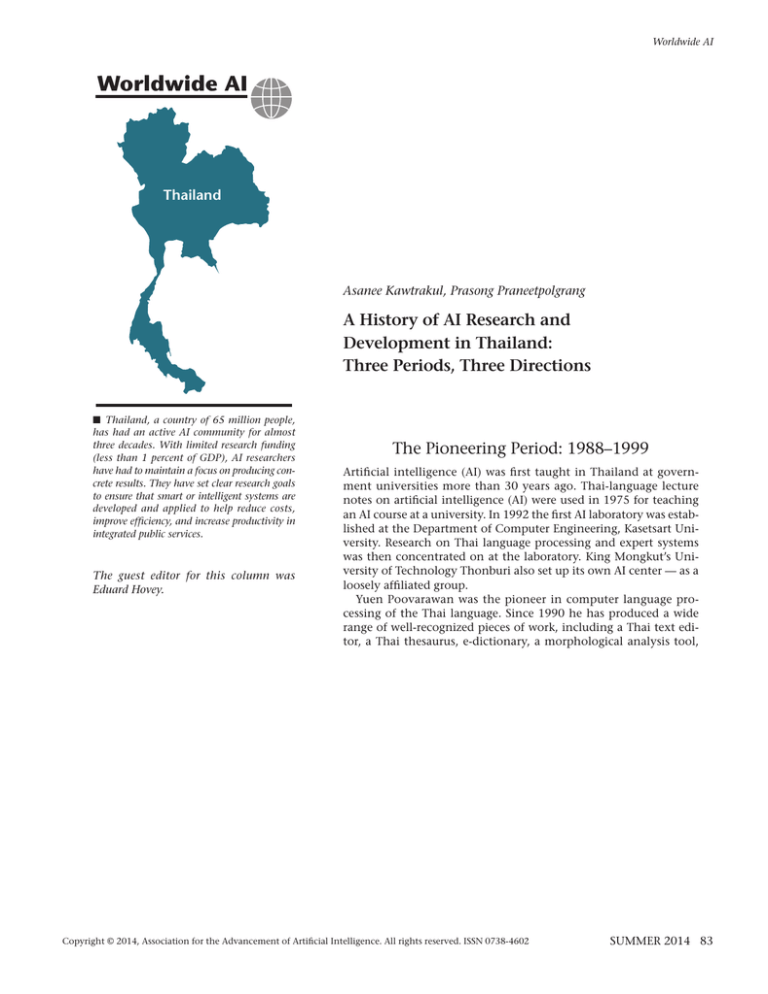
Worldwide AI
Worldwide AI
Australia
Thailand
Asanee Kawtrakul, Prasong Praneetpolgrang
A History of AI Research and
Development in Thailand:
Three Periods, Three Directions
n Thailand, a country of 65 million people,
has had an active AI community for almost
three decades. With limited research funding
(less than 1 percent of GDP), AI researchers
have had to maintain a focus on producing concrete results. They have set clear research goals
to ensure that smart or intelligent systems are
developed and applied to help reduce costs,
improve efficiency, and increase productivity in
integrated public services.
The guest editor for this column was
Eduard Hovey.
The Pioneering Period: 1988–1999
Artificial intelligence (AI) was first taught in Thailand at government universities more than 30 years ago. Thai-language lecture
notes on artificial intelligence (AI) were used in 1975 for teaching
an AI course at a university. In 1992 the first AI laboratory was established at the Department of Computer Engineering, Kasetsart University. Research on Thai language processing and expert systems
was then concentrated on at the laboratory. King Mongkut’s University of Technology Thonburi also set up its own AI center — as a
loosely affiliated group.
Yuen Poovarawan was the pioneer in computer language processing of the Thai language. Since 1990 he has produced a wide
range of well-recognized pieces of work, including a Thai text editor, a Thai thesaurus, e-dictionary, a morphological analysis tool,
Copyright © 2014, Association for the Advancement of Artificial Intelligence. All rights reserved. ISSN 0738-4602
SUMMER 2014 83
Worldwide AI
25
Research Area
21.62
Applications
20
Percentage (%)
17.72
16.22
15.19
15
13.51
12.66
13.51
12.66
12.66
10.81
11.39
10.81
10.13
10
8.11
7.59
5.41
5
0
Speech
NLP
Expert
system
Image
Machine
learning
Robot
Intelligent
CAI
Others
Figure 1. The Ratio of Research and Development and Application Areas.
Modified from Kijsirikul and Theeramunkong (1999)
and the first book on natural language processing
(NLP) in Thai. The first NLP laboratory, called the
NAiST Lab, was founded at the Department of
Computer Engineering, Kasetsart University, formerly a subdivision of the first AI laboratory. It is
now expanded to the Center of Excellence, supported by National Electronics and Computer
Technology Center (NECTEC), and focuses on
merging together two types of technology: knowledge engineering and language engineering, thus
leading to the setting up of the Center of Excellence, called UKNOW, at Kasetsart University.
The first national-level research project in Thailand focused on machine translation. From 1988
to 1991 this project included the Center of the
International Cooperation for Computerization of
Japan (CICC), NECTEC, and Thailand’s Chulalongkorn University, Kasetsart University, King
Mongkut’s Institute of Technology Lad Krabang,
King Mongkut’s Institute of Technology North
Bangkok, and Kriek University. CICC and NECTEC
are very important cores in developing NLP technology in Thailand.
In 1992 and again in 1999 (Kijsirikul and Theer-
84
AI MAGAZINE
amunkong 1999), questionnaire surveys of
NECTEC and CICC about AI technological development, which revealed that the national research
plan (1997–2001) did not clearly encourage the
development of in-depth research in AI. As a result,
the National Electronics and Computer Technology Center (NECTEC) put together research development plans in AI-related fields, for example, natural language processing, expert systems, and
intelligent image processing. Rapidly, AI research
by universities and major research organizations in
Thailand grew to cover speech processing, NLP,
expert systems, image processing, machine learning, robotics and other mechanical instruments,
intelligent computer-aided instruction (Intelligent
CAI), intelligent information retrieval, information extraction and summarization, data mining
and knowledge engineering, intelligent control
systems, and forecasting systems. Figure 1 shows
the most popular areas as of 1999. In those early
days, AI researchers mainly graduated from Edinburgh, Japan, and the USA. They obtained funding
from the National Research Council of Thailand
(NRCT) and the National Electronics and Computer Technology Center (NECTEC) of the National
Worldwide AI
Knowledge
Sharing
year
2013
Knowledge
Agent/Mobil
Ambient
Access
Meta Knowledge
Repositories
KM Service
Knowledge
Mining
Semantic Web
2008 - 2013
NLP
Multimedia
Archives
Ontology
Best
Practice/Diagnosis
2005 - 2007
Evaluation
Tools
2003 - 2004
Tools for Identifying,
Collecting, Classifying
Mobile
Application
Document
And Content
Processing
Metadata
Schema
Web
Authoring
Applications
Information
Exchange
Standardization
Authoring
Tools
E-Learning/
E-training
Organizing
Tools
Multimedia
Intelligent
Accessing
Tools
Secure
Access to
Distributed
Information
MUI
Tools
Information
Retrieval
Wireless
Network
Sharing
Tools
Personal and Departmental Archives and Information System
Figure 2. A Technology Roadmap for Knowledge Sharing Platform Development.
(National Research Council of Thailand 2001)
Science and Technology Development Agency
(NSTDA).
In NLP and speech processing, AI research
focused on machine translation, word segmentation, spell and style checking, speech recognition,
speech synthesis, and speaker identification.
Examples of AI research in expert systems were
agricultural expert systems, student consulting systems for registration processing, and environmental expert systems. More universities took part in
this area of AI research, including King Mongkut’s
Institute of Technology North Bangkok and
Bangkok University. In image processing, research
on Thai optical character recognition, handwritten
Thai character recognition, and medical photograph recognition was conducted with collabora-
tion from two more private universities, Rangsit
University and Mahananakorn University.
Research on robots had an emphasis on electric
chairs for the disabled and robot contests.
Research Roadmap
Creation: 2000–2005
During the period between 2000 and 2005, the
National Research Council of Thailand (NRCT),
Thailand’s major fund granter, concentrated on
creating research roadmaps. The ICT Master Plan
Years 2001–2010 was created with the goal to make
Thailand a knowledge society with five areas of
strength: e-Government, e-Education, e-Society, eIndustry, and e-Commerce. In 2001 Kasetsart Uni-
SUMMER 2014 85
Worldwide AI
versity, granted by NRCT, produced 10 additional
roadmaps (National Research Council of Thailand,
2001). One of them, for developing knowledge
sharing, aimed at transforming the country into a
knowledge-based society. Figure 2 illustrates this
roadmap. Obviously, instruments for storing, processing, and accessing knowledge were needed,
giving AI research a great chance to become
embedded in Thailand’s national development
plan. For instance, this included natural language
processing systems for extracting and coding data
from unstructured text, algorithms for data mining and knowledge discovery, ontologies and the
semantic web, and knowledge service development.
Synergy and
Alignment: 2006–2010
AI research from 2006 to 2010 was conducted
through collaboration among national research
institutes and universities under national strategies
for ICT. Research questions or objectives were for
the first time determined by the national development plan instead of by researchers themselves.
Outcomes assessment no longer relied on the
number of publications, but instead consisted of
measuring impacts, incomes, publications, prototypes, and patents. The development of AI research
in the third period thus underlined applicationoriented work, for it was had to be integrative, tangible, and assessable. The number of publications
or patents was not the only concern.
NECTEC was one of the institutions responding
to the new research direction between 2007 and
2010. It developed an empowered research program, called the knowledge engineering technology (KET) development platform, which aimed to
transform Thailand into a knowledge society. The
KET program was an engineering discipline that
addressed industrial problems and served the technology development needs of a knowledge society.
It emphasized acquisition, collection, accessing,
processing, sharing, and integration, and services
of knowledge. NECTEC also determined three flagships1 in support of more integrative work —
Smart Health, Smart Farm, and Digitized Thailand
— to create links among research outputs from collaborating educational institutions. Figure 3 shows
a link between the National ICT Master Plan (Ministry of Information and Communication Technology 2010) and the Smart Health Flagship.
In figure 3, one of the main pillars in the ICT
2020 framework (left side) is Smart Health, corresponding to the Smart Health Flagship in the
roadmap at right, where AI research is embedded
in both technology and application tracks. The left
track contains AI-related software and hardware,
for example, image processing, speech processing,
86
AI MAGAZINE
speech processing, biosensors, and intelligent
devices, while applications are the diagnosis system, the reminder system, the early cancer detection system, and the expert system.
Apart from their research grant policy, NSTDA/NECTEC also worked in partnership with various universities to establish Centers of Excellence
on university campuses. The Center of Excellence:
Unified Knowledge Engineering and Language
Engineering (UKNOW CoE) at Kasetsart University,
founded in 2009, has created a roadmap for AIrelated technological development for 2009–2014
(Center of Excellence: Unified Knowledge Engineering and Language Engineering 2010) (see figure 4), in alignment with the strategies proposed
by NECTEC and the Ministry of Information and
Communication Technology. Information extraction, question answering systems, machine translation, ontology construction, and tools were focal
points. The following domains are highlighted:
agriculture, education, medicine, and tourism. The
right side of the figure shows how to apply knowledge representation and processing in the development of an agricultural knowledge bank used for
transforming an agricultural society into a knowledge society.
Practical Applications of AI
Research (From 2011 Onwards)
Research institutes that have continuously carried
out AI-related research with practical applications
include research institutes at NECTEC; the Knowledge, Information, and Data Management (KIND)
Laboratory at Sirindhorn International Institute of
Technology of Thammasat University; and the
Unified Knowledge Engineering and Language
Engineering (UKNOW) Center at Kasetsart University. KIND particularly pays attention to information extraction technology and language processing. The following are two outstanding AI research
projects with practical applications.
Speech Technologies and Health Care
Among a number of technology branches, text-tospeech (TTS) synthesis has shown itself a mature
technology applicable for practical use. TTS for
Thai is considerably more complicated than those
of other well-known languages due to the uniqueness of the Thai language.
Vaja, a bilingual Thai/English TTS developed by
Speech and Audio Technology Lab (SPT) at
NECTEC, is a successful research result that has
been integrated in a variety of applications and
services. Since 2011, more than 70 state hospitals
have used Vaja to call patient names in compliment with patient registration numbers in their
queuing systems. Vaja has been applied for voice
information services in some telephone call cen-
Worldwide AI
A
Smart Thailand 2020
Stronger
Economy
Social
Equality
Environmental
Friendly
Smart Agriculture
Smart Health
Smart Services
Smart Learning
Smart Environment
(ICT of Green and
Green ICT)
Smart Government
ICT Human Resources and
ICT Competent Workforce
ICT Industry
ICT Infrastructure
ICT 2020 Framework
B
Healthy Thailand
Roadmap
Smart Health - Smart Living
NHIS &
Knowledge-Base
with International Standard
Intelligent
Devices
2018
Chance Discovery and
Knowledge Discovery /
Advanced Computing Model
Intelligent Portable
Devices / Wearable
Health Devices
e-Health Care
Services and Tools
Expert System
Preventive Care Services
Early Cancer Detection,
Mobile Therapies
2013
Intelligent Medical
Record Processing
2012
2011
2010
2009
2008
Speech Processing
Text Processing
Mobile Devices for
Preventive Medicine
Tele Health Care
Services/Telemedicine
Sensors for Health /
CT Scanner
Emergency Call Center /
Telereferral System
Image Processing
Knowledge Representation
and Processing
Data MiningMeta
Data Broker and Tools
Data Standardization,
Data Quality, and Security
Control Process
Data / Knowledge /
Software Engineering
Body Area Network
Bio-Sensor
Diagnosis and Reminder System
/ Digital Ecosystem for
Preventive Medicine
Search Engine for Research
Archive / KM Based Risk
Screening
Cholesterol / Triglyceride Sensor /
Thermo-Screen
Integrated Technologies /
Devices
Planning and Analysis
Software / e-Learning
Applications /
Services
Infrastructure
Figure 3. Alignment of the Smart Health Flagship with the ICT Master Plan.
(a) ICT Master Plan for 2020. (b) The Smart Health Flagship of NECTEC.
SUMMER 2014 87
Worldwide AI
A
2010
Th-egiv
2011
KU radio green
Deliverable
Dcare portal
2012
MoU extraction
Tourism info. service
Health cyberbrain
Disaster MT
Easy translation for taxi
Medical Ontology
ASIAN + 3 Dictionary
Agri. knowledge service
LD Project
Tourism knowledge service
Alro cyberbrain
MY Guide Digital Library
Outbreak tracking
Franco-Thai “Easy Media
Corpus Management
Anti-KobPae
Automatic Ontology
Extraction from ICD-10
Digital Library
KU expert finder
2014
Orchid Web Portal
AOS Workbench
Anti-copy system
2013
Agri. K-Service
Agri. QA
PMM
UW++
Agri. FrameNet
Orchid Portal
Basic QA
Corpus annotation tools
Policy mngt framework
Text simplification system
Product
Multimedia archiving platform
Multimedia transcription system
Knowledge portal
Info. extraction Engine
Data Intelligent Processing Tool
Ontology construction and Ontology based Data Interoperability
Services Engineering and Innovation
Technology
Machine translation
Knowledge engineering (Extraction, Aggregation, Representation, Modeling, Services)
Question answering (Semantic analysis and Discourse processing)
Information and meta-data extraction
Language Engineering: Alignment Tools, Annotation Tool, Linguistic Knowledge Construction, Parsers
Language corpus development, standards and Tools
B
A Development of Knowledge Bank and
Knowledge Service for the Farmers
Data Intelligence System with Human Sensors
Water /Meteorological
W
Market data
Survey Data
Real Time Data
from Station
Expert
Software Tools for Knowledge Acquisition,
Searching and Storage
Data Extraction, Integration and Data Storage System
Data Processing Center
Field Data
Field Data and
Information
Knowledge of 32 plants
Analytic Model
Water Requirement
Forecasting
Agriteacher
Web page
Knowledge Processing System
Plant Productivity
Forecasting
Pests Forecasting
e-expert
Web
Portal
Question Answering
System
Knowledge Service System
Decision Support System
Data Monitoring
g and
Knowledge Service Center
Strategic Planning System
Knowledge Service
Kiosk
Monitoring
System
Tailor-made Knowledge
One-stop
Service
Search
Engine
Warning
System
Farmer
Farmer
Farmer
Knowledge Broker
Figure 4. A Roadmap for AI-Related Technological Development for 2009–2014.
(a) Knowledge Engineering and Language Engineering Roadmap developed by UKNOW CoE. (b) An Example of Knowledge
Bank in Agricultural Construction for Agricultural Knowledge Society Development.
88
AI MAGAZINE
Worldwide AI
Queuing system in
Over 70 hospitals
Android TTS engine
With +10000 downloads
Voice response
in the top traffic
info service iOS App
Voice info service
in the biggest
online newspaper
Impact made by
VAJA Thai/Eng TTS
Figure 5. The TTS Application and Its Impact.
ters such as a diabetes self-care service at Chulalongkorn hospital and a traffic information service
at NECTEC. It has also been exploited in a multilingual speech translation mobile application
developed under an international collaboration
called U-STAR.2
Regarding the assistive technology, Vaja has been
applied as an interface for people with visual dis-
ability to access information in online newspapers
since 2010. Figure 5 shows its applications and its
deployment throughout the country.
Knowledge Engineering
and Agricutural Cyber Brain
With the development of the Internet and the
world wide web, the enormous number of knowl-
SUMMER 2014 89
Worldwide AI
CyberBrain
Knowledge Society
Result
Strenghten
Community
Smart Farmers
Smart Coop
System
Syst
tem
Hub
Community Cyber Brain
Hub
Coop Cyber Brain
Process & Input
Disease Diagnosis and Treatment Services
Knowledge Acquistion and Personalize Service
Tailor-made Fertilizing Service
Mr.CyberBrain
Soil Analysis and service
Knowledge
Partner
Local Gov.
Mr.CyberBrain
One-stop service
Expert
Farmers
Coop
Figure 6. An Implementation of Expert System and Knowledge Services for Agricultural Domain.
edge resources prevents knowledge consumers
from effectively and efficiently accessing the information they need. Knowledge fusion is one of the
solutions. Cyber-Brain (Kawtrakul et al. 2008, Kawtrakul et al. 2013) is a community-based platform
of services and tools that facilitates IT infrastructure consolidation, information sharing, and collaboration across agencies, partners, and public
boundaries. This platform operates to avoid IT
duplication between agencies and facilitates integration of IT resources within the federal government and among federal, state, and local governments. With Cyber-Brain, appropriate and
90
AI MAGAZINE
personalized knowledge services will be provided
to support problem solving, decision making, and
early warning.
Since the world population will increase from 7
to 9 billion by 2050, more food will be needed to
meet demand. In Thailand, rice is the national
food staple and represents the main income sustaining farmers (66 percent of 5.7 million agricultural households are rice farmers). The CyberBrain, as a platform of community knowledge
sharing and delivering services in the agricultural
domain (especially rice), has been implemented for
evaluating nontechnical interoperability and har-
Worldwide AI
SRI KM, Model, Prototype, Infrastructure, Standard
Ubiquitous Life Long Learning
Business
Bu
B
usiness
i
Model
M d l / Marketi
Marketing
M
k ting
Agriculture
Health Care
Energy and Environment
Living
Liv
iving
i
Tourism
SRI-TH
& SIGs
Meeting
g
SRI-TH
Workshop
SRI-TH
(SRII Asia Summit 2013)
SRI-TH
Conference
SRI-TH
Conference
SRI-TH
Conference
2011
2012
2
2013
2014
2015
20
015
2016
Knowledge Engineering, Security, Sensor Technology
Wireless Sensors Network (WSN), Cloud computing,
(IoT )
Internet of Thing (IoT)
Infrastructure, Data standardization, etc
Social Network Software, Analytic and Predictive Model,
Component business Model
Figure 7. Service Innovation Roadmap Developed by Service Research Innovation of NSTDA and SRII Thailand Chapter.
vesting the best practices for knowledge society
development. Figure 6 shows the implementation
platform through a collaboration with Agricultural Cooperatives who are the drivers of implementation of rice diagnosis and treatment services, tailor-made fertilizing services, and soil analysis and
service.
Four of 4500 agricultural cooperatives have been
implementing such strategies to formulate the
framework and guidelines for best practices in eagricultural information services. The success factors strongly depend on cohesive working networks and multisector engagement, including the
government agencies that own the data.
The Future by 2020: AI Inside
Smart Services for Better Life in
Thailand
AI research has become increasingly important in
application systems to meet the growing demands
of the country. Impacts are required on national
economic, social, and industrial development.
NECTEC therefore has assembled researchers interested in putting AI research to practical use. The
SRII (Service Research and Innovation Institute)
Thailand Chapter3 was founded in 2011 to develop service innovation roadmaps based on AI-related technologies such as knowledge engineering,
SUMMER 2014 91
Worldwide AI
Visit AAAI on Facebook!
We invite all interested individuals to
check out the Facebook site by searching for AAAI. We welcome your feedback
at info14@aaai.org.
analytic models, big data analysis, and information
extraction (see figure 7). Displayed in figure 7 is the
Smart Province pilot project,4 proposed by the
Governor of Nakhon Nayok in 2012. This challenging project, supported by NECTEC and Kasetsart University in alignment with the Ministry of
ICT’s strategy Smart Thailand 2020, aims to
demonstrate the accomplishment of AI and ICT
research investments over the last 25 years.
Today, as a result of collaborations among universities, private organizations, and the government sector, the number of killer applications for
various public services is growing, as evident in
Smart Health, Smart Education, Smart Tourism,
Smart Energy, Smart Home, and Smart Agriculture.
It is a good sign that the Ministry of Information
and Communication Technology has seen the
importance of integrated service innovation leading to the development of Smart Government and
better quality of life for Thai people as a whole.
Notes
1. See the National Electronics and Computer Technology Center, 2011. Flagship Projects (in Thai). Available at
nectec.or.th/index.php?option=com_content&view=article&id=2221&Itemid=1071.
2. See www.ustar-consortium.com.
3. See www.sri-thailand.org.
4. See www.ny-thailand.net.
References
Center of Excellence: Unified Knowledge Engineering
and Language Engineering. 2010. Knowledge Engineering and Language Engineering Roadmap. In Annual
Report (in Thai). Bangkok, Thailand: Ministry of Science
and Technology.
92
AI MAGAZINE
Kawtrakul, A.; Pusittigul, A.; Ujjin, S.; Lertsuchatavanich,
U.; and Andres, F. 2013. Driving Connected Government
Implementation with Marketing Strategies and ContextAware Service Design. Paper presented at the 13th European Conference on Government (ECEG13), Varese,
Italy, 13–14 June.
Kawtrakul, A.; Sriswasdi, W.; Wuttilerdcharoenwong, S.;
Khunthong, V.; Andres, F.; Laovayanon, S.; Jenkollop, D.;
Narkwiboonwong, W.; and Pusittigul, A. 2008. CyberBrain: Towards the Next Generation Social Intelligence.
Paper presented at the Joint World Conference on Agriculture Information and Information Technology,
IAALD, AFITA, WCCA 2008, Tokyo, Japan, August 24–27.
Kijsirikul, B., and Theeramunkong, T. 1999. Survey on
Artificial Intelligence Technology in Thailand, December.
Survey Report, Chulalongkorn University, Department of
Computer Engineering.
Ministry of Information and Communication Technology. 2010. Thailand’s ICT Master Plan 2020 (in Thai),
revised version 2.0. Bangkok: Kingdom of Thailand.
National Research Council of Thailand. 2001. A Study of
Information Technology Research in Thailand, Research
Report (in Thai). Bangkok, Thailand: NRCT.
Asanee Kawtrakul is currently an associate professor in
language and knowledge engineering technologies at
Kasetsart University and a senior consultant with
NECTEC. She obtained a B.Eng. and M.Eng. in electrical
engineering (honors) from Kasetsart University in Thailand and a D.Eng. in information engineering from
Nagoya University, Japan. Her current research focuses
primarily on language technologies to support knowledge acquisition and management, utilization and
knowledge service. She has led various large-scale
research projects related to country strategy such as Agricultural Knowledge Service, Smart Health Project, Smart
City Project, and others. She also leads the Natural Language Processing and Intelligent Information System
Technology Laboratory (NAiST) at Kasetsart University.
She has published more than 90 papers and books.
Prasong Praneetpolgrang received a B.Sc. (1st Hons) in
electrical engineering from the Royal Thai Air Force Academy, Bangkok, Thailand, in 1987, a Master’s degree in
computer engineering, 1989, a Master’s degree in electrical engineering, 1993, and a Ph.D. degree in computer
engineering from Florida Institute of Technology, Florida, USA, in 1994. He currently has the rank of associate
professor at the Faculty of Information Technology, Sripatum University, Bangkok, Thailand. His research interests are in the areas of computer and information security, trust management and it governance, e-commerce,
and cloud applications. Prasong Praneetpolgrang has
more than 100 published articles and books in these
areas. He has served on program committees of both
international and national conference on computer science and engineering, information technology, and ebusiness. He is a member of IEEE and ACM. He is listed
in Who’s Who in the World in Information Technology. In
addition, he received ASEAN Outstanding Engineering
Achievement — Contribution Award in 2013.

